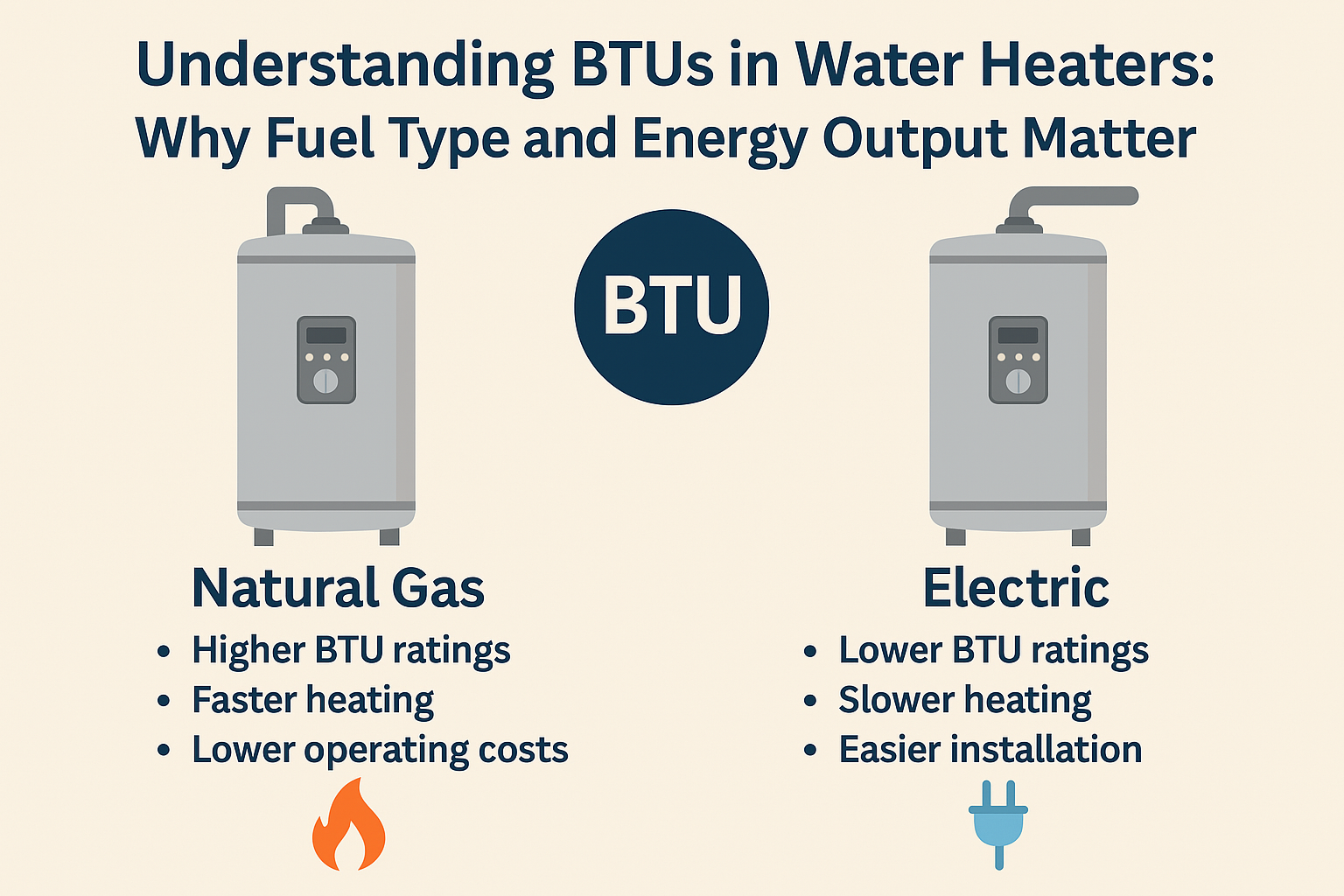Understanding BTUs in Water Heaters: Why Fuel Type and Energy Output Matter
When selecting a water heater for your home, it's essential to understand key factors that influence performance and efficiency. Among these, the unit's BTU rating and the choice between natural gas and electric models are paramount. This guide will explain what BTUs are, how they affect your water heater's performance, and the differences between natural gas and electric units to help you make an informed decision.
What Is a BTU?
BTU stands for British Thermal Unit, a standard measure of heat energy. Specifically, one BTU is the amount of energy required to raise the temperature of one pound of water by one degree Fahrenheit. In the context of water heaters, the BTU rating indicates the unit's heating capacity—the higher the BTU rating, the more heat the water heater can produce per hour.
Why BTU Rating Matters
The BTU rating of a water heater directly impacts two critical aspects:
Recovery Rate: This refers to how quickly the water heater can reheat water after it's been used. A higher BTU rating means a faster recovery rate, ensuring that hot water is readily available even during periods of high demand.
Energy Consumption: While a higher BTU rating can provide more hot water, it may also lead to increased energy consumption. It's important to balance your household's hot water needs with energy efficiency to avoid unnecessary utility costs.
Natural Gas vs. Electric Water Heaters
The choice between natural gas and electric water heaters involves several considerations, including energy efficiency, operating costs, and installation requirements.
Natural Gas Water Heaters:
BTU Ratings: Typically, natural gas water heaters have higher BTU ratings compared to electric models, resulting in faster heating and recovery times.
Operating Costs: Natural gas is often less expensive than electricity, which can lead to lower monthly operating costs.
Installation: Requires access to a natural gas line and proper venting to expel combustion gases.
Electric Water Heaters:
BTU Ratings: Electric water heaters generally have lower BTU ratings, leading to slower heating and recovery times.
Energy Efficiency: Electric units are often more energy-efficient because they don't lose heat through venting. However, the cost of electricity can offset these efficiency gains.
Installation: Easier and less expensive to install, as they don't require gas lines or venting systems.
Other Important Factors to Consider
When choosing a water heater, also take into account:
First-Hour Rating (FHR): This measures the amount of hot water the heater can supply in the first hour of use. A higher FHR is beneficial for households with high simultaneous hot water demands.
Energy Factor (EF): Indicates the overall energy efficiency of the unit. A higher EF means more efficient energy use.
Size and Capacity: Ensure the water heater's capacity aligns with your household's hot water usage to avoid shortages or energy waste.
Conclusion
Understanding BTUs and the differences between natural gas and electric water heaters is crucial for selecting a unit that meets your home's needs efficiently. Consider factors like recovery rate, operating costs, installation requirements, and your household's hot water demand to make an informed choice. Consulting with a licensed plumbing professional can also provide personalized recommendations based on your specific situation.
If you're unsure which water heater is right for your home, Applause Plumbing is here to help. Our experienced, licensed, and insured plumbers can guide you through the decision-making process—from choosing the correct size and fuel type to explaining BTU ratings and energy efficiency. We proudly serve homeowners throughout the Lehigh Valley, including Easton, Phillipsburg, and Stewartsville. Give us a call today to schedule your water heater installation or consultation—we’re happy to help you find the perfect fit for your home and family.


